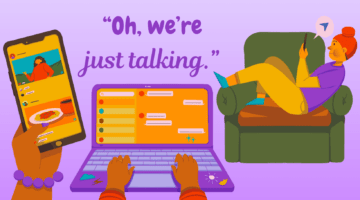Does Playing Hard To Get Pay Off?
March 20, 2013 by Justin Lehmiller
According to some of the most popular dating advice books, one of the keys to attracting a romantic partner is to take the somewhat counterintuitive step of pretending like you aren’t interested in the other person. But does this tactic really work? Can “playing hard to get” really help you score a date? According to a new set of studies published in the European Journal of Personality, it would appear so.
In one of these studies, researchers gave 270 heterosexual college students three dating profiles that were equivalent in terms of attractiveness, age, and background information [1]. The only thing that differed was the likelihood that the person would go out with someone they had just met (i.e., the target was described as having either low, intermediate, or high availability). Participants were asked to choose which person they would be most likely to have casual sex with, which one they would be most likely to date, and which one they would be most likely to start a romantic relationship with. Participants could choose the same or different persons for each option.
When it came to casual sex, both men and women overwhelming preferred the highly available target. So, if you’re hoping to get lucky, playing hard to get is not particularly advantageous. However, when it came to dating and starting a romantic relationship, both men and women preferred the target with intermediate availability. So, if you’re looking for love, playing at least a little hard to get seems advisable.
In another study, the researchers gave heterosexual college student participants photos of equally attractive targets that again varied in perceived availability (low, intermediate, or high). Participants were asked what kind of restaurant they would take this person to (fast food, casual, or fine dining) and how much money they would be willing to spend on the other person’s dinner.
In this case, the low availability targets won hands down. Both men and women reported that they would take the low availability target to a fancier restaurant, as well as spend more money on this person. Specifically, the low availability target was worth $44.45 on average, compared to $34.99 and $33.10 for the intermediate and high availability targets, respectively. In other words, playing hard to get may lead your date to spring for a better meal.
One other question this set of studies sought to answer is how people play hard to get. To answer this, the researchers asked a sample of men and women whether they have ever played hard to get and, if so, how they accomplished this. Women reported playing hard to get more often than did men. In addition, the two most commonly reported tactics were acting confident and talking to other people, with men and women being equally likely to say that they had done these specific things before. However, several other reasons were reported, and some important sex differences emerged. Specifically, women were more likely than men to say that they do things like not calling, not talking much, and keeping busy. In contrast, men were more likely than women to report things like “saying all the right things but not calling,” “acting snotty or rude,” and “treating others like sh*t.” Fortunately, those last two were rated as occurring with very low frequency. I should also mention that just because at least a few people reported doing these behaviors, it does not necessarily mean that they work!
Of course, these findings are limited in that they only looked at college students and, further, all participants were heterosexual. However, the results suggest that if you’re looking for casual sex, being more available will make you more successful–but if you’re looking for love, playing hard to get is the better strategy. In other words, when it comes to love, the old adage rings true: “why buy the cow when you can get the milk for free?”
Want to learn more about The Psychology of Human Sexuality? Click here for a complete list of articles or like the Facebook page to get articles delivered to your newsfeed.
[1] Jonason, P. K., & Li, N. P. (in press). Playing hard‐to‐get: Manipulating one’s perceived availability as a mate. European Journal of Personality.
Image Source: 123rf.com
You Might Also Like:

Dr. Justin Lehmiller
Founder & Owner of Sex and PsychologyDr. Justin Lehmiller is a social psychologist and Research Fellow at The Kinsey Institute. He runs the Sex and Psychology blog and podcast and is author of the popular book Tell Me What You Want. Dr. Lehmiller is an award-winning educator, and a prolific researcher who has published more than 50 academic works.
Read full bio >


